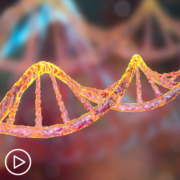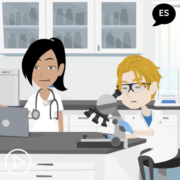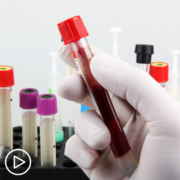Do Prostate Cancer Genetics Differ in African Americans?
Do Prostate Cancer Genetics Differ in African Americans? from Patient Empowerment Network on Vimeo.
Do the genetics of prostate cancer vary in African Americans? Expert Dr. Isaac Powell from Karmanos Cancer Institute discusses what research has shown about gene expression and what occurs in the body in African Americans versus European Americans.
[ACT]IVATION TIP
“…patients need to take charge by asking questions about the therapy. Again, ‘is it going to cure me, and is the chemotherapy going to cure, immunotherapy going to cure? If not, how long do we think that I will live?’ That’s a good question, that I’d like to know if I were a patient.”
See More from [ACT]IVATED Prostate Cancer
Related Resources:

|

|

Advanced Prostate Cancer Outcomes: Addressing Disparities and Exploring Solutions |
Transcript:
Lisa Hatfield:
So, Dr. Powell, I just read a bit about your really impressive research, particularly with regard to the biology and genetics of prostate cancer. Can you provide an overview of your research focus on how prostate cancer impacts African Americans in comparison to other ethnic groups?
Dr. Isaac Powell:
Yes, I would certainly love to do that. In 2010, we found that the cancer grows faster among African Americans compared to European Americans. And those are the terms we use now, as opposed to Black and white. In science, we use those terms. And so at that point, I thought that this may be driven by the genetics and biology. So in 2013, we used what now has been considered the artificial intelligence.
We use bioinformatics, which is computational biology, and gene interactive and network analysis to evaluate the cancer tissue. And so at that point, we identified, and we asked the question, are there genetic differences between African Americans and European Americans? And what they found were driver genes, driver genes being the genes that drive the cancer, that make the cancers carry out a function, a mechanistic function, as opposed to passenger genes that are just associated with the cancer, just as in a car, the driver is the one that controls the car, the passenger sits there. These passenger genes, yes, they’re associated with aggressive cancer, but they have minimal or no function. The driver genes are the ones that are controlling the cancer, the function mechanism of the cancer progression. And so we identified in our analysis 21 genes that were different between African Americans compared to European Americans, different in terms of the expression of the disease, not different genes, but different expression of the genes.
What we found is that African Americans have a greater expression of inflammatory genes and transcript genes. And I’ll be more specific about that in a moment. Whereas European Americans had a higher expression of lipid metabolism genes. Those are genes that are associated with fatty acids as well as unsaturated fatty acids, specifically omega-6 as opposed to omega-3. But there is a connection between these two gene interactions at one particular molecule called tumor necrosis factor. And this gene then interacts with both the lipid metabolism genes as well as other inflammatory cytokines. And the genes that we found that were more specific in among the inflammatory genes were the pro-inflammatory cytokines, and those were IL-6 tumor necrosis factor, IL-8, and IL-1B as well as CXCR4.
These are what are called pro-inflammatory cytokines and chemokines. And they carry out functions that cause the cancers to invade. First of all, the cancer initial is cancer cells are stuck together. We call them adherent. They have to come apart before they can spread and go elsewhere. Well, these genes cause that it’s called epithelial mesenchymal transition. And once that happens, they’re capable of being transferred to distant sites such as the bone. And they also cause increased blood flow to the cancer. They also cause the oxidative stress that is driven by a molecule called reactive oxygen species.
And we’ll come back to that particular molecule because that’s important. Once it causes the oxidative stress, this causes DNA damaged repair genes to develop as well as mismatch genes. This mismatch means there are gene molecules that are stuck together, and there is an order. This order is upset by this particular oxidative stress, and those are mutated once they are repaired, and they impact on the mitochondria, which is a molecule in the cell nucleus that controls the chemistry of the cell.
And then this activates cancer stem cells, which is really important. And this is where we are going now with the cancer research. So TNF, the tumor necrosis factor IL-6 and IL-8, and the IL means interleukins. That’s what that stands for. They activate that pathway, the oxidative stress pathway. They also individually activate other pathways that lead to cancer stem cells. And I mentioned cancer stem cells because that’s the reason why chemotherapy and immunotherapy and all the drugs that we’ve used don’t work because the cancer stem cells undergo mutations and these mutations change the character of the cell.
And that’s why the cancer cells resist that after a certain period of time, now these drugs will work and prolong survival, but they do not cure them because of the cancer stem cells. And so the cancer stem cells, in summary, are driven initially by the pro-inflammatory cytokines. So my research currently is to, well, how do we inhibit these pro-inflammatory cytokines? And that’s where we are now trying to develop a drug. We’re at the stage of mouse at this time, mouse biology and testing the drug in mice, not ready yet for human testing. So that’s where my research is headed, and I believe that that is going to work if the drug works.
Lisa Hatfield:
So just a follow-up question to that is, as a if I were a patient of yours or a family member, I might ask, so with your findings, do you think that this could lead to a cure, for example, for advanced prostate cancer?
Dr. Isaac Powell:
Yeah. I hate to use the word cure. The word I use is that we, our goal is to eliminate death from prostate cancer. That’s the term I prefer, because when we talk about cure, we have to know what causes it in order to really be certain as we are curing it. Because I don’t know whether what we’re doing is going to eliminate death, but that’s our goal. So I don’t like to use the word cure, because that’s the magic word and everybody gets excited. So I don’t want to get people excited too soon. So that’s where I am with my research.
Lisa Hatfield:
Well thank you so much for that. And do you have an activation tip for patients for this question, Dr. Powell?
Dr. Isaac Powell:
Yes. I think that, again, patients need to take charge by asking questions about the therapy. Again, is it going to cure me, and is the chemotherapy going to cure, immunotherapy going to cure? If not, how long do we think that I will live? That’s a good question, that I’d like to know if I were a patient. In fact, I’ve had prostate cancer and bladder cancer, so mine was early, so we didn’t get into those kinds of questions. But I like to know whether is this going to be something soon or later? Nobody can tell you when you may pass away from any cancer. I never give a patient any time. If they ask me, “Well, am I going to live six months or three years?” I don’t know. Because everybody’s different. Everybody responds differently to these particular treatments. So, but ask the questions as specific as possible that you’d like to know about the treatments, because there are several treatments, and there may be many answers.










